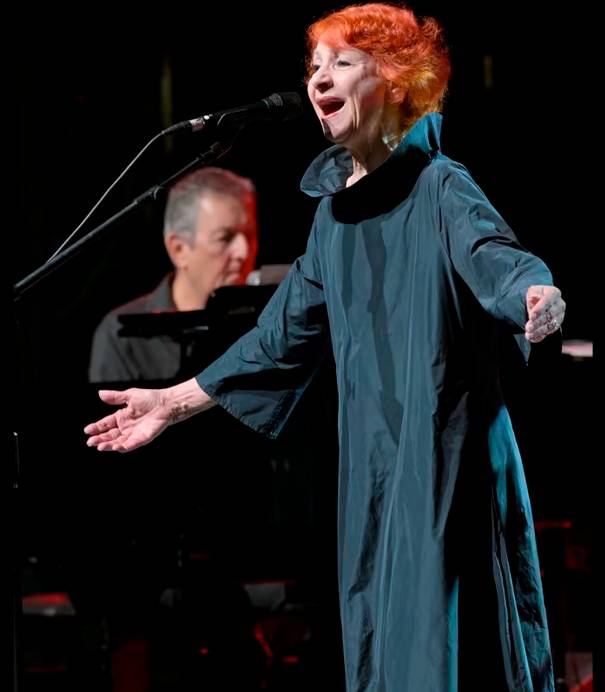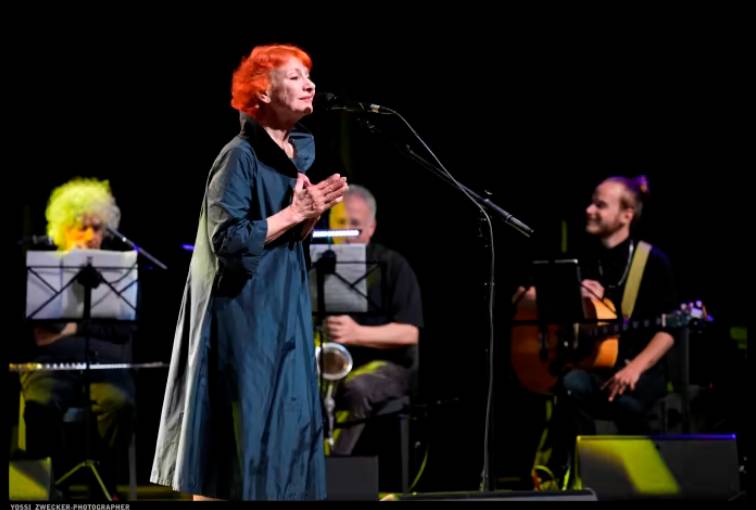
Much more symbolic: there is rarely an opportunity to see a giant like Esther Ofarim in action
(rough English translation, original article to read on Walla)
Ofarim, a singer with a surprising voice, tremendous charisma, theatrical performance and endless charm, provided a mesmerizing experience in a rare performance in Israel with Yoni Rechter. In a world full of people who fake success and ability or buy them, there is nothing more powerful than looking at a real stage artist. Impressions from a perfect concert
Nadav Menuhin 20/04/2022

Huge.
Esther Ofarim (Photo: Yossi Tzabker)
The Holon Theater was crowded last night, and it was impossible to find a
place in the nearby cafe or on the benches on the second floor. Towards the main
performance of the evening, even the buffet almost emptied of merchandise, and
the overcrowding around it broke records. This crowd did not come because Margie
or Noa Kirl came to the city, but in honor of the traditional "Days of
Singing" festival in Holon and its main attraction - a performance by
singer Esther Ofarim, one of the great symbols of Hebrew singing for
generations, whose performances in Israel in recent decades are rare. The crowd,
made up almost entirely of senior citizens and older in spirit, did not intend
to let this opportunity slip away. Ofarim was a big star in the 60s and 70s in
Israel, but also had great success throughout Europe. For many years now, the
center of her life has not been here, but she has not really been forgotten, and
last night's show - which was also shared by Yoni Rechter, himself one of the
top musicians in Israel - is evidence of this. But it is not only nostalgia that
has driven the evening - because Ofarim, above all, is much more than a symbol
of the past - she is a one-of-a-kind singer, with a surprising voice, tremendous
charisma, theatrical performance and endless magic. It was mesmerizing: a person
rarely gets to see a real virtuoso in front of him in action - a performer who
is so good at what he does, so impressive, so masterful of the basics. In a
world filled with people who fake success or buy it, there is nothing more
powerful than looking at the power of pure talent and unparalleled
professionalism.

Ofarim
and Rechter (Photo: Yossi Tzabker)
As mentioned, Ofarim has not lived in Israel for many years, and at the same
time is a symbol of Israeliness. Accordingly, her repertoire consists of some of
the best-known Hebrew songs, alongside classics from around the world, and in
between these and many more songs about foreignness, loneliness and wandering.
In a long performance (about 20 songs), this selection adds up to a long and
exciting journey. She was surrounded by six musicians, including Rechter himself
on the accompanist standard, who rarely joined in the singing. Sometimes a large
ensemble is meant to compensate, to fill the void that a singer has a hard time
filling - but that was far from the case in this show. Next to the singer's high
and melancholy voice, the modest arrangements, and even the minimalist ones in
part, did not try to overshadow at all - but only to support a little.
Tremendous charisma.

Ofarim (Photo: Yossi Tzabker)
From the very beginning, the classics "Ve'ulai" and "Layla Layla" - of which Ofarim is the ultimate performer - invite emotions about a distant past that has disappeared. Her voice, added to the beautiful effect of time, resonates and rings. Need nothing more than that. Still, the audience always joins. Probably when she sang Leonard Cohen's "Hallelujah," and everyone pledged together to stand before the God of Poetry with nothing but this psalm on their lips. The first part of the evening ends with more classics, including "Somewhere over the rainbow", "She's leaving home" and also Rechter's "Dma'ot shel malachim" and 14 octaves, which suddenly seemed more innocent than ever. In this song, Ofarim was confused by the words in the opening of the song, but thanks to Rechter who joined her, the performance was complete. Then Ofarim left the stage, and evacuated her to Rechter and the band, which only then began her exile in all its beauty. After an instrumental piece called "A Midsummer Night's Dream," Rechter sang "Three at Night in the City" composed by Gidi Gov and "Standard Love Song" composed by Arik Einstein. These are great songs though, but I was surprised by the choice of them instead of songs from Rechter's solo career, and maybe that was his way of emphasizing that the focus this evening is not on him, but on the singer who will be back soon. An unforgettable evening.

Ofarim (Photo: Yossi Tzabker)
Ofarim returned with "Hitragut" - an ancient song that never miraculously flowed, and continued in a beautiful sequence: "Tzipor Shnyia" which she recorded with Rechter for the project "Order of the Hour" ("I saw a beautiful bird"), the exciting duet "Ten li yad" which was one of the highlights of the evening , A spectacular rhetorical adaptation of the song "Ma omrot eynaich" - by this time the band was already more relaxed - and finally the classic "Shir hanoded". It was possible to detail the nuances, depth and wonder of each of them - but it does not seem necessary, because the experience itself is a whole. These are familiar and beloved songs, but no moment in them was worn. Ofarim sang each of them as if they were one-time, and with obvious pleasure. Later there will also be versions of "Alabama song", "Mad about the boy" and another song by Leonard Cohen, "Like a bird on wire". It's a familiar and wearily plowed song. Ofarim gave him his most beautiful performance I have ever heard. Despite the hopes, Ofarim did not perform her favorite "Stav" or "Cinderella Rockefella". Although she will end the show, to the delight of the audience, to the sounds of "Shirat hanoded", she also did not part without "Hayu Leilot" - her ultimate song, and with which she is most identified. The sad ballad of Yaakov Orland, which describes a love story that was cut short in the paths between Degania and the Sea of Galilee, Over the years she has also become a lament for the passing of time, the youth that is ending and the changing world, easy and material when the singer is in her ninth decade and most of the people in the audience are already embracing grandchildren. But when all of these sing together about the nights that will carry another end of their days, they may also have thought about this perfect concert, and the rare opportunity to see on stage one of the greatest of them all.